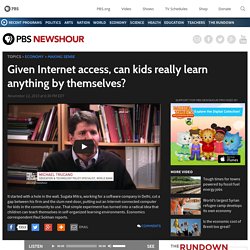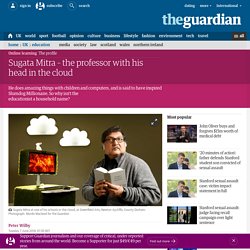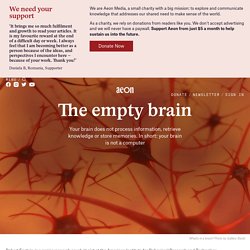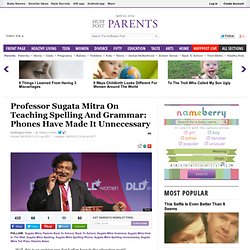

Sugata mitra education. Sugata mitra education. Given Internet access, can kids really learn anything by themselves? GWEN IFILL: But, first, how a simple experiment in India has turned into a radical idea, whether students should teach themselves by giving them a computer and stepping back.

Economics correspondent Paul Solman reports, part of our Making Sense series, which airs every Thursday on the NewsHour. STUDENT: Why do dogs chase cats? PAUL SOLMAN: I have absolutely no idea. A public elementary school in Harlem, New York, is adopting a radical idea that threatens the education industry as we know it, SOLEs, Self-Organized Learning Environments. STUDENT: How do you make a computer? STUDENT: How come father seahorses have babies, but the females don’t? PAUL SOLMAN: The students come up with the questions, and then choose one to answer. SUGATA MITRA, Newcastle University: OK, so now here’s what’s going to happen. PAUL SOLMAN: A crowd of onlookers in a nearby room, waiting to know if, given six computers and just 20 minutes, these kids can really self-organize and learn the answer on their own. Sugata Mitra – the professor with his head in the cloud.
The story of how Sugata Mitra put a computer in a hole in a Delhi wall at the end of the last century and how uneducated children used it to teach themselves all manner of things is now well known.

So is the story of how Mitra’s work inspired the novel, Q&A, that became the film Slumdog Millionaire. But no government has taken more than a passing interest in his vision. Nor, although teachers have often tried his methods and reported miraculous results, have professional associations and university education departments responded with much enthusiasm. Seventeen years after Mitra conceived the idea that a computer could act as a kind of village well from which children could freely draw knowledge, the educational world treats him with deep scepticism.
But Mitra launches into a speech about “what is happening to the world”. “In India, I found two illiterate people texting each other. And what entertainment! It was repeated in several hundred learning stations in India and elsewhere. Your brain does not process information and it is not a computer. No matter how hard they try, brain scientists and cognitive psychologists will never find a copy of Beethoven’s 5th Symphony in the brain – or copies of words, pictures, grammatical rules or any other kinds of environmental stimuli.

The human brain isn’t really empty, of course. But it does not contain most of the things people think it does – not even simple things such as ‘memories’. Our shoddy thinking about the brain has deep historical roots, but the invention of computers in the 1940s got us especially confused. For more than half a century now, psychologists, linguists, neuroscientists and other experts on human behaviour have been asserting that the human brain works like a computer. To see how vacuous this idea is, consider the brains of babies. A healthy newborn is also equipped with more than a dozen reflexes – ready-made reactions to certain stimuli that are important for its survival.
We don’t store words or the rules that tell us how to manipulate them. Should students be allowed to use the internet in exams? At a recent British Council debate, Is teaching obsolete?

, Professor Sugata Mitra called for internet-connected devices to be taken into the exam hall. Here is a transcript of his argument. I don't think we have to look at whether teaching has become obsolete, we need to look at the examination system. Teachers are the way they are because of the examination system in schools. They don't have a choice. Let's look at examinations. My Journey with Kalkaji SinC Continues by Rekha Sharma – School in the Cloud. Hello all of you.

I have brought some new and fresh experiences hearing of which will give you goosebumps. When I see and hear my students I feel so glad for which I have no words as no one can express such things in words. When I joined this school, the children were not so well mannered and patient. Whenever I used to enter the school, I used to feel bad to observe the atmosphere and the language, especially the wordings used by the students. What can the Western education system learn from the developing world? Students in Karakati, India, research the answer to a big question at a location of Sugata Mitra’s School in the Cloud.

According to Mitra and his Microsoft Work Wonders Project partner, Adam Braun, there’s quite a bit that Western schools can learn from classrooms in the developing world. Lessons in spelling 'have no place in 21st century schools' Professor Sugata Mitra On Teaching Spelling And Grammar: Phones Have Made It Unnecessary. Well, this is an opinion you don’t often hear in the education world.

Acclaimed professor and educational researcher Sugata Mitra suggested in an interview with British education magazine TES that he no longer thinks it's entirely necessary for kids to learn spelling and grammar. He credits the proliferation of new technologies, such as the "autocorrect" feature on mobile phones, for phasing out such curricula. Spelling? My phone takes care of that - news. Literacy Comment:Last Updated:13 August, 2013Section:news Education guru Sugata Mitra challenges the ‘right’ way to write Learning how to spell and construct grammatical sentences has long been considered a basic pillar of good schooling.

But now one of education’s most radical and influential thinkers has claimed that the growth of technology makes spelling and grammar a “bit unnecessary”, at least in their conventional form. Sugatam - home. Conversation with Prof. Sugata Mitra: The Hole-in-the-wall experiments Online Class by Dr. Nellie Deutsch.